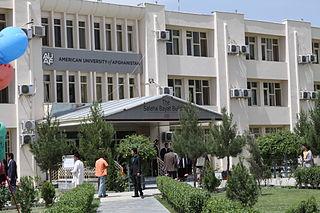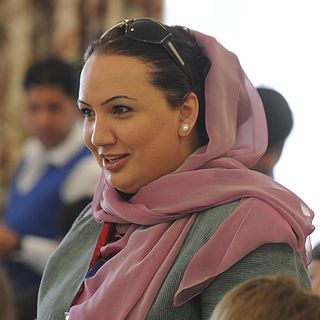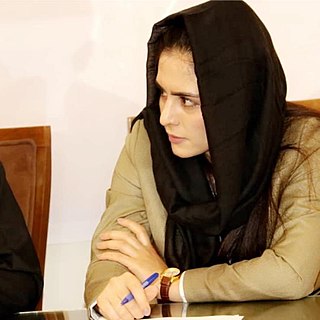Related Research Articles

Afghanistan, officially the Islamic Emirate of Afghanistan, is a landlocked country located at the crossroads of Central Asia and South Asia. Referred to as the Heart of Asia, it is bordered by Pakistan to the east and south, Iran to the west, Turkmenistan to the northwest, Uzbekistan to the north, Tajikistan to the northeast, and China to the northeast and east. Occupying 652,864 square kilometers (252,072 sq mi) of land, the country is predominantly mountainous with plains in the north and the southwest, which are separated by the Hindu Kush mountain range. Kabul is the country's largest city and serves as its capital. According to the World Population review, as of 2023, Afghanistan's population is 43 million. The National Statistics Information Authority of Afghanistan estimated the population to be 32.9 million as of 2020.

The Taliban, which also refers to itself by its state name, the Islamic Emirate of Afghanistan, is an Afghan militant movement with an ideology comprising elements of Pashtun nationalism and the Deobandi movement of Islamic fundamentalism. It ruled approximately 75% of the country from 1996 to 2001, before it was overthrown by an American invasion. It recaptured Kabul in August 2021 following the departure of coalition forces, after 20 years of Taliban insurgency, and now controls all the country. The Taliban government is not recognized by any country and has been internationally condemned for restricting human rights, including for women to work and have an education.

The treatment of women by the Taliban refers to actions and policies by two distinct Taliban regimes in Afghanistan which are either specific or highly commented upon, mostly due to discrimination, since they first took control in 1996. During their first rule of Afghanistan, the Taliban were notorious internationally for their misogyny and violence against women. In 1996, women were mandated to wear the burqa at all times in public. In a systematic segregation sometimes referred to as gender apartheid, women were not allowed to work, nor were they allowed to be educated after the age of eight. Women seeking an education were forced to attend underground schools, where they and their teachers risked execution if caught. They were not allowed to be treated by male doctors unless accompanied by a male chaperone, which led to illnesses remaining untreated. They faced public flogging and execution for violations of the Taliban's laws.

Mohammad Ashraf Ghani Ahmadzai is an Afghan former politician, academic, and economist who served as the president of Afghanistan from September 2014 until August 2021, when his government was overthrown by the Taliban.

The Kakar is a Gharghashti Pashtun tribe, based in Afghanistan, parts of Iran, and northern Balochistan in Pakistan.

Education in Afghanistan includes K–12 and higher education, which is under the Ministry of Education and Ministry of Higher Education. In 2021, there were nearly 10 million students and 220,000 teachers in Afghanistan. The nation still requires more schools and teachers. Soon after the Taliban take took the country in August 2021, they banned girls from secondary education. Some provinces still allow secondary education for girls despite the ban. In December 2022, the Taliban government also prohibited university education for females in Afghanistan, sparking protests and international condemnation. In December 2023, investigations were being held by the United Nations into the claim that Afghan girls of all ages were allowed to study at religious schools.
Human rights in Afghanistan are severely restricted, especially since Taliban's takeover of Kabul in August 2021. Women's rights and freedom are severely restricted as they are banned from most public spaces and employment. Afghanistan is the only country in the world to ban education for women over the age of eleven. Taliban's policies towards women are usually termed as gender apartheid. Minority groups such as Hazaras face persecution and eviction from their lands. Authorities have used physical violence, raids, arbitrary arrests and detention, torture, enforced disappearances of activists and political opponents.

Suhaila Siddiq, often referred to as 'General Suhaila', was an Afghan politician. She served as the Minister of Public Health from December 2001 to 2004. Prior to that, she worked as the Surgeon General in the military of Afghanistan. As a government minister, she was given the title Honorable before her name. Siddiq was one of the few female government leaders in Afghanistan, and is the only woman in the history of Afghanistan to have held the title of lieutenant general. General Seddiq had worked for the government of Afghanistan since the reign of Mohammed Zahir Shah, and was additionally a paratrooper of the Afghan Commando Forces.

Women's rights in Afghanistan have oscillated back and forth depending on the time period as well as the regime in power. After King Amanullah Khan's attempts to modernize the country in the 1920s, women officially gained equality under the 1964 Constitution. However, these rights were taken away in the 1990s through different temporary rulers such as the mujahideen and the Taliban during the Afghan civil war. During the first Taliban regime (1996–2001), women had very little to no freedom, specifically in terms of civil liberties. When the Taliban was overthrown by the United States following the September 11 attacks, women's rights gradually improved under the presidential Islamic Republic of Afghanistan. Women were de jure equal to men under the 2004 Constitution.

The Ministry for the Propagation of Virtue and the Prevention of Vice is the state agency in charge of implementing Islamic law in the Islamic Emirate of Afghanistan as defined by the Taliban. It was first instituted in 1992 by the Rabbani government of the Islamic State of Afghanistan and adopted in 1996 by the Taliban government of the Islamic Emirate of Afghanistan of 1996–2001. The ministry was restored in the reinstated Islamic Emirate in September 2021 after the August fall of Kabul.

Shukria Barakzai is an Afghan politician, journalist and Muslim feminist. She was the ambassador of Afghanistan to Norway. She is a recipient of the International Editor of the Year Award.
As a geographically fragmented state, Afghanistan is separated into as many as 14 ethnic groups that have historically faced divisions that devolved into political violence. This conflict reached its culminating point in the 1990s with the rise of the Taliban.

Sahraa Karimi is an Afghan film director who was the first female chairperson of the Afghan Film Organization. She has directed 30 short films, 3 documentary films and one fiction film Hava, Maryam, Ayesha which had the world premier at the 76th Venice Film Festival. Prior to the fall of Kabul to the hands of the Taliban, she was the first and, as of 2021, only woman to be directing Afghanistan's film entity.
The People's Peace Movement or Helmand Peace Convoy is a nonviolent resistance grassroots group in Afghanistan, created in March 2018 after a suicide car bomb attack on 19 March in Lashkargah, Helmand Province. The PPM calls for the military forces of both the government of Afghanistan and the Taliban to implement a ceasefire and advance the Afghan peace process. The group marched across Afghanistan to Kabul, where it met leaders of both parties and conducted sit-ins in front of diplomatic posts, before continuing its march to Balkh and Mazar-i-Sharif, arriving in September 2018.

On 15 August 2021, Afghanistan's capital city of Kabul was captured by the Taliban after a major insurgent offensive that began in May 2021. It was the final action of the War in Afghanistan, and marked a total victory for the Taliban. This led to the overthrowing of the Islamic Republic of Afghanistan under President Ashraf Ghani and the reinstatement of the Islamic Emirate of Afghanistan under the control of the Taliban.
Protests in Afghanistan against the Taliban started on 17 August 2021 following the Fall of Kabul to the Taliban. These protests are held by Islamic democrats and feminists. Both groups are against the treatment of women by the Taliban government, considering it as discriminatory and misogynistic. Supported by the National Resistance Front of Afghanistan, the protesters also demand decentralization, multiculturalism, social justice, work, education, and food. There have been pro-Taliban counterprotests.

Crystal Bayat is an Afghan social activist and human rights advocate known for her protests against the Taliban takeover, advocacy for women rights and political activism inside and outside Afghanistan. A native of the Ghazni province, Shia (coming from the Bayat family, a Turkic ethnicity minority, Bayat was born in 1997 in Kabul. She grew up most of her life with democracy and positive societal changes. She is currently continuing the fight to preserve Afghan human right's achievements as an agent of change.
The politics of Afghanistan are based on a totalitarian emirate within the Islamic theocracy in which the Taliban Movement holds a monopoly on power. Dissent is not permitted, and politics are mostly limited to internal Taliban policy debates and power struggles. As the government is provisional, there is no constitution or other basis for the rule of law. The structure is autocratic, with all power concentrated in the hands of the supreme leader and his clerical advisors. According to the V-Dem Democracy indices Afghanistan was as of 2023 the 4th least electoral democratic country in the world.
References
- 1 2 3 4 Jaafari, Shirin (July 7, 2023). "Women in Afghanistan are devastated by the Taliban's ban on beauty salons". The World from PRX. Retrieved 2023-09-20.
- 1 2 3 4 5 6 7 8 9 Shahalimi, Nahid (2022-08-16). We Are Still Here: Afghan Women on Courage, Freedom, and the Fight to Be Heard. Penguin. ISBN 978-0-593-47291-0. Archived from the original on 2023-09-21. Retrieved 2023-09-20.
- 1 2 Nelson, Soraya Sarhaddi (August 17, 2022). "Afghan women raise their voices in two new anthologies". NPR. Archived from the original on August 17, 2022. Retrieved September 20, 2023.
- ↑ ""Since the Taliban are Pashtuns, we are sorry": Pashtun civil activists". Aamaj News. 2022-05-12. Archived from the original on 2022-12-09. Retrieved 2023-09-20.
- 1 2 3 "Interview with Former FBI Special Agent and Yale University Senior Lecturer Asha Rangappa; Interview with Novelist Hari Kunzru; Interview with PEN America CEO Suzanne Nossel; Interview with "We Are Still Here" Editor Nahid Shahalimi. Aired 1-2p ET". transcripts.cnn.com. August 19, 2022. Archived from the original on 2022-09-25. Retrieved 2023-09-20.
- ↑ "Urgent letters from Afghanistan: 'I hope the world will not forget us'". BBC News. 2021-12-07. Archived from the original on 2023-05-06. Retrieved 2023-09-20.
- 1 2 Latifi, Ali M. (September 4, 2021). "Women march in Kabul to demand role in Taliban government". www.aljazeera.com. Archived from the original on 2021-09-04. Retrieved 2023-09-20.
- ↑ Saayin, Asma (2021-12-16). "Kabul women rally for right to education, work". Pajhwok Afghan News. Archived from the original on 2023-06-07. Retrieved 2023-09-20.
- ↑ "100 Letters Sent To UN Security Council Regarding Dire Situation of Afghan Women". Afghanistan International. 2023-09-20. Archived from the original on 2023-09-21. Retrieved 2023-09-20.
- ↑ "UN Deputy Secretary-General's Remarks on Taliban Recognition Draw Reactions". Nimrokh News. 2023-04-22. Archived from the original on 2023-04-29. Retrieved 2023-09-20.
- ↑ Kawa, Amin (2023-08-02). "Controversies Surrounding U.S.-Taliban Talks; Human Rights and Women Activists: Disheartening and Shameful". Hasht-e Subh Daily. Archived from the original on 2023-08-03. Retrieved 2023-09-20.